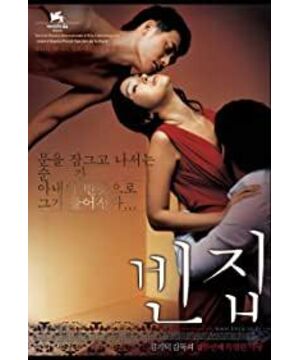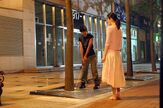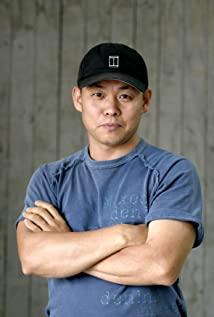To be a cold stone, to be a violent torrent, to be an angry lightning, in short, to do everything, that is, not to be a human being!
——Sartre
"I am a wanderer without travel companions in the world, but I will not stop loving, and I will not stop searching for the destination of my soul." This is the monologue I want to say for the hero of "Empty Room", It was also for director Kim Ki-duk.
The man kept looking for empty houses, wandering among different people. He is looking for a space where he can be completely isolated, ostensibly to escape and hide, but in fact he is looking for his true self in a different room. The quiet room of a stranger's house is a paradise for him, as quiet, free, warm and safe as in his mother's womb. Henry Miller said that the greatest tragedy in life is not seeing the world as a giant womb. In fact, in life, we are constantly seeking the warm touch of a mother's womb and arms. The joy we seek every day and night, the satisfaction we keep seeking; the pleasure that material desires bring us, the comfort of our friends and lovers; these are but shadows of the warmth of a mother's womb. Humans are womb worshippers, eager to return to the mother body. We are conceived from the womb and grow on the way back to the womb. The male protagonist in the film feels more calm and indifferent in a stranger's room than in the outside world, and is as free as a bird even in prison. To him, the empty room seemed to be filled with the nutrients of his mother, which made him perfect and cultivate himself, and exercised his "invisibility" ability.
This "invisibility" ability of the male protagonist makes use of the space where the human eye can only see the 180° perspective in front of him, and he hides the world behind that is ignored by others. In fact, we are all blind, busy all day and lost in the world in front of us. Who would have thought that what we really need might be the unknown world behind us. This "invisibility" cannot be simply classified as an escape from the real world. On the contrary, "invisibility" is a kind of sobriety and a higher state. Abandoning reality is to pursue a higher reality, and the real world has lost its original beauty and cannot be used as the big womb that nurtures us. What the director preaches through the film is not only to be a free self, but also to fight against a distorted world. Kim Ki-duk can be described as a modern Kafka, and the films are permeated with a post-modern atmosphere reflecting on modernity.
100 years ago, Kafka worried about the future of mankind. He said, "Despite the crowds, everyone is silent and lonely. It's so pathetic that people are getting more and more lonely minute by minute in the ever-increasing crowd. We are not living in a destroyed world, but Living in a chaotic world." Kafka describes the little people living at the bottom of society, who are panic, uneasy, lonely and lost in a world full of contradictions and distortions, yearning for tomorrow but can't see a way out. Today, 100 years later, Kim Ki-de, like Kafka, still depicts marginalized people living in a chaotic and alienated modern society. Kim Ki-deok said, I only photographed marginalized people, and I only photographed marginalized people, and I was only interested in marginalized people.
The male protagonist in the film is actually an atypical marginal person. He went to college and got good grades, and considering his ability to fix things, finding a decent job was no problem at all. But he drives a motorcycle all day long, wandering the streets and other people's homes like a ghost. This can't help but make everyone puzzled, why a child at a young age doesn't want to live a happy life as a normal person, and would rather choose to be an outlier that others hate? Our lives are getting better and better, but it seems that culture is destroying and people have lost their way. Are we going to be who we are, or are we going to be what society has made us to be? Maybe marginalized people don't just refer to such a small group of people, it involves serious social problems. Jung believed that man in modern society is in danger of completely losing his shadow, becoming a slave of his own fiction and a purely conceptual world that gradually replaces reality.
The film expresses anxiety about the authenticity of human life. Is modernity bringing us progress or regression? Technology is advancing day by day and life is getting better and better, but the distance between people is getting farther and farther, and the contradictions are getting deeper and deeper. No wonder Sartre said that others are hell. This unavoidable conflict in the presence of others is not a life-and-death duel, but is mainly a conscious and emotional disturbance, resulting in a detachment between people. Maybe the male protagonist is not an anomaly, we are an anomaly. Behind several of the doors he opens in the film, what we see is cold and messy instead of warm and peaceful. Even after the families of these homeowners came back, what we saw was not laughter, but more indifference, irritability and conflict. Travel brings us more troubles than happiness; we can also leave the old people at home and go out to play alone; there is no longer love between husband and wife, but quarrels with each other. However, Kim Ki-duk also shows us a completely different scene in the film. The male and female protagonists once entered a special farm family. The male and female masters of this family did not have as many troubles as the people in the city. They lived a poor but happy and harmonious life. The home is also well organized, with goldfish and beautiful plants. It is particularly noteworthy that the first kiss between the male and female protagonists is in this farmhouse. At this time, the film also echoes the gentle background music, which is obviously the director's intention. What is even more contrasting is that when the heroine was in prison, the heroine once again returned to this farmhouse alone to rest for a while. Compared with other urban families, the hostess and the hostess of the farmhouse readily accepted this behavior. This can't help but remind me of the scene when I went back to my hometown in the countryside when I was a child. The door was not closed, everyone ate together, and even visited each other late at night, which was in stark contrast to the isolation and indifference of the city. Kafka said that on the surface, people in the office are more noble and lucky, but this is only an illusion. In fact, they are lonelier and less fortunate. Intellectual labor pushes people into groups of people. On the contrary, handicraft ushers people into groups. Through this farmhouse, Kim Ki-deok depicts the morbidity and alienation of modern society, and at the same time shows the beauty of human life.
Kim Ki-duk is a silent man, and likewise the protagonists in all of his films have almost no dialogue, and the same is true in "Empty Room." In addition to highlighting the director's super-powerful picture performance ability, it is also to express an existential outlook on life. Existentialism believes that human beings are isolated and helpless in the face of the world. Individuals undertake this meaningless world and are in a state of being abandoned. We all live in the loneliness of the abyss. Wittgenstein said that language has limitations and does not allow for deeper communication. If you can speak, you can speak clearly; if you can't speak, you should keep silent. Indeed, misunderstandings and sorrows in life are often caused by our inability to express ourselves clearly in words, and also cannot truly understand the words of others. There is no communication between people, so in the face of the world and others, I would rather be silent. Conscience, Heidegger said, speaks only often in silent form. Therefore, the actor in the film did not defend himself when he was mistaken by the police as the murderer of the old man. Aggressive speech is an illusion and a trick that people often use to hide their shortcomings in front of themselves and the world, and there is too much power in silence, and the enduring power lies in this enduring. It is a high philosophical realm to acquiesce to loneliness in loneliness and to respond to the chaotic world with silence. At the end of the Coen Brothers' 2001 film "The Absentee", the hero recites silently before the electrocution, "Maybe in heaven, people will listen to me tell everything, everything that is indescribable in the world." Outside this distorted reality, it is possible There is also a wonderful utopia where we can live happily. At the end of "The Empty Room", the male protagonist successfully lives with the female protagonist by his own "invisibility". This is another world, like a beautiful dream. In this film, Kim Ki-duk perfectly combines cruelty and beauty, contains shocking beauty in pessimism, and conveys soul-shattering love in cruelty. In the film, although the hero and heroine are silent, don't forget the only word that the heroine said to the hero: "I love you!"
- Published in "Literary Life Weekly"
View more about 3-Iron reviews









